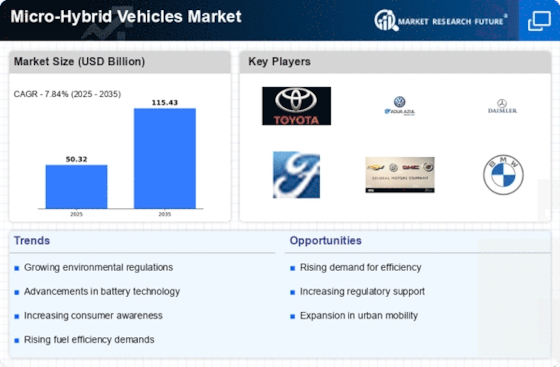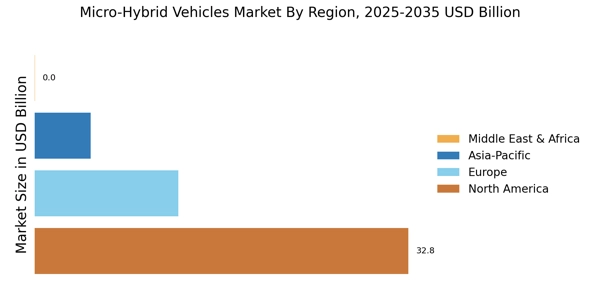Consumer Demand for Fuel Efficiency
The Micro-Hybrid Vehicles Market is witnessing a notable shift in consumer preferences towards fuel-efficient vehicles. As fuel prices fluctuate, consumers are increasingly seeking alternatives that offer better mileage without compromising performance. Micro-hybrid vehicles, which utilize start-stop technology and energy recovery systems, provide a compelling solution to this demand. Recent surveys indicate that a significant percentage of consumers prioritize fuel efficiency when purchasing a vehicle, suggesting a robust market potential for micro-hybrid models. This growing consumer awareness and demand for sustainable options are likely to propel the Micro-Hybrid Vehicles Market forward, encouraging manufacturers to innovate and expand their product lines.
Rising Fuel Prices and Economic Factors
The Micro-Hybrid Vehicles Market is also influenced by rising fuel prices and broader economic conditions. As fuel costs continue to escalate, consumers are increasingly motivated to seek vehicles that offer better fuel economy. Micro-hybrid vehicles, which combine traditional internal combustion engines with electric power assistance, present a viable solution to mitigate fuel expenses. Economic factors, such as disposable income and consumer confidence, also play a crucial role in shaping purchasing decisions. In times of economic uncertainty, consumers may gravitate towards more economical vehicle options, thereby enhancing the appeal of the Micro-Hybrid Vehicles Market. This trend suggests a potential for sustained growth as economic conditions evolve.
Increased Awareness of Environmental Impact
The Micro-Hybrid Vehicles Market is benefiting from a growing awareness of environmental issues among consumers. As climate change and pollution become pressing global concerns, individuals are increasingly inclined to choose vehicles that minimize their carbon footprint. Micro-hybrid vehicles, which offer reduced emissions compared to traditional vehicles, align well with this consumer sentiment. Educational campaigns and advocacy for sustainable transportation options have further heightened awareness, leading to a shift in purchasing behavior. This trend indicates that the Micro-Hybrid Vehicles Market is poised for growth as more consumers prioritize eco-friendly options in their vehicle choices.
Regulatory Influence on Emissions Standards
The Micro-Hybrid Vehicles Market is significantly shaped by stringent emissions regulations imposed by various governments. These regulations aim to reduce greenhouse gas emissions and promote cleaner transportation solutions. For instance, many regions have set ambitious targets for reducing carbon emissions from vehicles, which has led to an increased focus on micro-hybrid technologies. The adoption of these vehicles is often incentivized through tax breaks and subsidies, making them more attractive to consumers. As a result, the Micro-Hybrid Vehicles Market is likely to expand as manufacturers adapt their offerings to comply with these regulations, thereby driving innovation and market growth.
Technological Advancements in Micro-Hybrid Vehicles
The Micro-Hybrid Vehicles Market is experiencing a surge in technological advancements that enhance vehicle efficiency and performance. Innovations such as advanced energy management systems and regenerative braking technologies are becoming increasingly prevalent. These technologies allow vehicles to capture and reuse energy that would otherwise be lost, thereby improving fuel economy. According to recent data, the integration of these technologies can lead to fuel savings of up to 15% compared to conventional vehicles. As manufacturers continue to invest in research and development, the Micro-Hybrid Vehicles Market is likely to see a proliferation of new models equipped with cutting-edge features, appealing to environmentally conscious consumers and fleet operators alike.


















